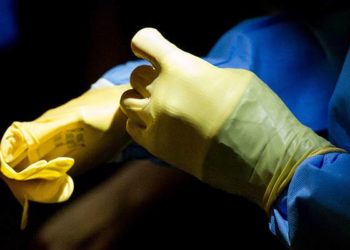Virtual reality may decrease procedural distress in pediatric IV placement
1. In a single-center randomized control trial, young children in the pediatric emergency room who participated in a virtual reality (VR) experience had lower standardized pain scores during the placement of intravenous catheters (IVs).
2. Subgroup analysis suggested that the effect of the VR experience on decreasing visible distress and perceived pain was stronger for female patients.
Evidence Rating Level: 2 (Good)
Study Rundown: Inflicting procedural discomfort on children represents a significant challenge for providers and caregivers in pediatric practice. Researchers at Seoul National University built upon the increasing body of evidence for the use of virtual reality as an effective means of pain reduction by creating a high-resolution VR simulation that placed pediatric patients in the middle of a forest exploration with four animal friends, projecting this simulation on a domed ceiling in a procedural treatment room. Eighty-eight children aged 6 months to 4 years undergoing IV placement were randomized to either standard distraction techniques or distraction with the VR experience. The children’s responses to IV placement were video-recorded, with pain intensity assessments assigned by two protocol-blinded physicians utilizing the Face, Legs, Activity, Cry, and Consolability (FLACC) scale. Caregivers were provided a questionnaire querying their satisfaction with the procedure and their assessment of their child’s pain. Overall, the VR intervention resulted in a significantly decreased probability of having higher FLACC scores. Moreover, caregivers rated their child’s pain and anxiety significantly lower if they were assigned to the VR experimental group, though there was no difference in their satisfaction with the overall procedure. While this lends support to the growing interest in virtual reality as a method of psychological pain mitigation, the study suffers from technical and design limitations. Despite the overall reduction in FLACC scores throughout the entirety of the procedure in the VR group, distress at critical points in the procedure (i.e. tourniquet placement, needle insertion) was not significantly different between the control and experimental groups. Interestingly, subgroup analysis stratified by sex showed a significant decrease in FLACC scores for girls randomized to the VR experience, but not for boys in the same experimental group, with the authors positing that social expectations and/or the content of the VR experience may contribute to this gender-specific difference.
Click to read the study in JAMA Pediatrics
Relevant Reading: The effectiveness of virtual reality distraction for pain reduction: a systematic review.
In-Depth [randomized controlled trial]: This single-center parallel, two-group randomized controlled trial identified eighty-eight children ages 4 months to 6 years requiring non-urgent IV placement in the pediatric emergency room. Subjects were randomized into two groups: the control group received standard IV placement procedures while the second group participated in a novel virtual reality experience consisting of an imagined forest exploration with four friendly animals. Primary outcome measures were FLACC standardized pain assessments at five time points (T0=baseline, T1=immediately after child laid on the bed, T2=tourniquet application, T3=alcohol swabbing, T4=venipuncture) that were rated by two independent, protocol-blinded physicians reviewing a video recording of the procedure. Secondary outcomes included parent/caregiver satisfaction with the procedure and their subjective ratings of their children’s pain and anxiety on a 0-10 visual analog scale. Children assigned to the VR experience had significantly decreased odds of having higher FLACC scores compared to children in the control group (IQR 1.1-5.4 vs IQR 1.8-6.9, OR 0.53, p=0.049), though there was no significant difference when individual time points were compared across groups. Repeated measure analysis of variance for subgroups revealed that this effect persisted when assessing only girls across both experimental group and procedural time point (F=6.56, P=0.1 and F = 14.31, P<0.001 respectively), but failed to emerge when only boys were included in the analysis. Caretakers reported significantly lower perceptions of their child’s pain (5.0 [3.0-8.0] vs 7.0 [5.0-10.0], P=0.08) and anxiety (5.0 [3.0-7.0] vs 8.0 [6.5-10.0], P<0.001) if they were in the experimental VR group, though no significant differences in overall satisfaction with the procedure.
Image: PD
©2022 2 Minute Medicine, Inc. All rights reserved. No works may be reproduced without expressed written consent from 2 Minute Medicine, Inc. Inquire about licensing here. No article should be construed as medical advice and is not intended as such by the authors or by 2 Minute Medicine, Inc.




![2MM: AI Roundup- AI Cancer Test, Smarter Hospitals, Faster Drug Discovery, and Mental Health Tech [May 2nd, 2025]](https://www.2minutemedicine.com/wp-content/uploads/2025/05/Untitled-design-350x250.png)




